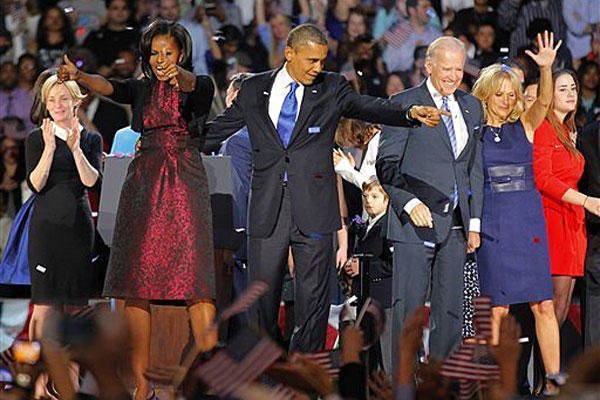America re-elected President Barack Obama on Tuesday to a second term as commander-in-chief.
Obama will oversee the withdrawal from Afghanistan through 2014 and lead the pivot to the Pacific as the military transitions from the war footing it has maintained for more than a decade.
In an election in which military and foreign policy issues never became a focus of either campaign, Obama faces plenty of challenges these next four years. The president will command a shrinking force as the U.S. military reduces its ranks as troops return home from war.
Obama oversaw the killing of Osama bin Laden -- a fact he touted repeatedly during the campaign. He has continued to authorize the military and CIA to kill al-Qaida and other terrorist networks in Afghanistan, Pakistan and Northern Africa.
The Obama administration must navigate the growing influence of China’s military in the Pacific region, as well as the threat of a nuclear Iran and how that could further destabilize the Middle East.
Going into 2013, the president will face extreme fiscal challenges tied to defense spending. The defense strategy stands to cut $487 billion in Pentagon spending, the result of the Budget Control Act Congress mandated last year.
Pentagon leaders supported the plan, but lawmakers couldn’t come to an agreement and tabled it to next year. All eyes will be on the president to push the plan forward in 2013 or make the changes necessary to get the cost-cutting budget passed into law.
An even bigger challenge facing the administration will come if Congress doesn’t find a way to prevent an additional $500 billion in sequestration cuts to defense slated to begin in January as mandated by law. Obama will face pressure to negotiate a bargain with the Republican-controlled House of Representatives to evade sequestration.
The Obama administration unveiled its new defense strategy in January that outlines a renewed focus on the Pacific region while reinvigorating a force to fight in hybrid wars that combines counter-insurgency and conventional warfare concepts.
Obama will get to further oversee that transition and shape the future military as the four services try to rebuild after 10 years at war. Service leaders will look to build on relationships with the Obama administration to modernize and upgrade their forces to align their services with the defense strategy.
Questions will begin over who will lead the Pentagon in Obama’s second term. Defense Secretary Leon Panetta, who will be 75 in June, has made no secret of his wish to retire early next year.
Other major appointments sit on the horizon, such as the head of U.S. Central Command. Marine Corps Gen. James Mattis is reaching the end of his assignment as the head of CentCom. Defense analysts have already suggested he could be replaced by an Air Force general or Navy admiral.
Military service leaders have put in place plans to reduce their forces. The Obama administration plans to cut 80,000 troops from the Army and 20,000 from the Marines. Romney had promised to halt force reductions on the campaign trail, although defense analysts had questioned how he planned to pay for the necessary force structure.
The Department of Veterans Affairs has already started to prepare for the wave of veterans leaving the service and transitioning to civilian life. Obama has overseen the stand up of numerous programs and beneficiaries to ease that transition for veterans.
Traumatic brain injuries and post-traumatic stress have evolved into the signature wounds of the Iraq and Afghanistan wars. Helping those veterans heal will be an ongoing challenge for Obama’s second term and probably his successor.
The administration is following through on already announced plans to hire hundreds more mental health workers and counselors to treat veterans with PTSD. The Army has laid out plans to invest millions into TBI research.
Obama has proposed an ambitious jobs program for veterans; however, it has stalled in Congress. The program to train thousands of veterans for jobs as first responders and to work in the nation’s state and national parks has been well received by veterans groups but has been caught up like so many other initiatives in Washington gridlock.
One possible sore point for retirees going forward may be the new defense bill’s modest Tricare Prime enrollment fee increases, which took effect Oct. 1 for working-age retirees. Gov. Mitt Romney had pledged to kill the increases, which were the first since the program began in the mid-1990s.
The law also means retiree Tricare Prime fees will be raised annually by a percentage relative to any raise in retired pay through annual cost-of-living adjustments. Retirees can also expect to see increases in pharmacy co-payments.
An area in which the White House will have to show progress is reducing the claims backlog. Though the administration hired more than 1,600 temporary claims processors to help tame the backlog starting in 2011, the numbers only grew.
-- Matthew Cox, Bryant Jordan and Richard Sisk contributed to this report
























